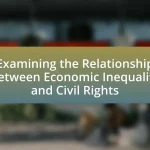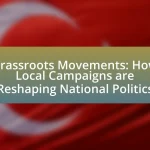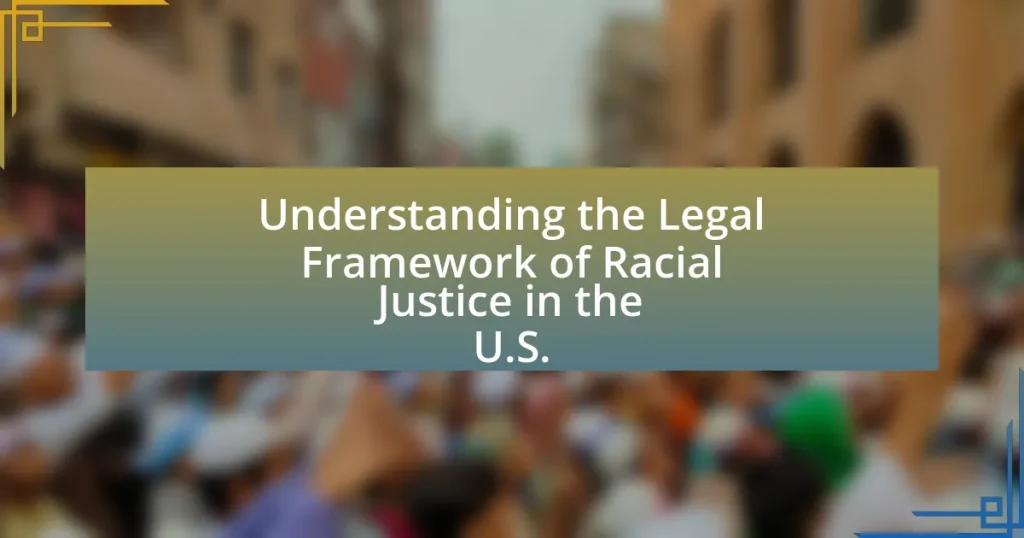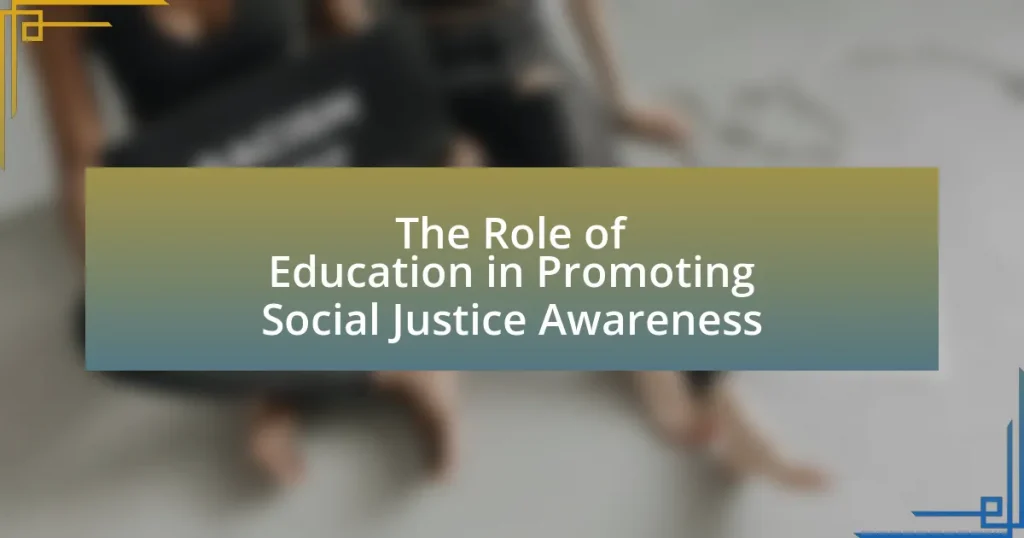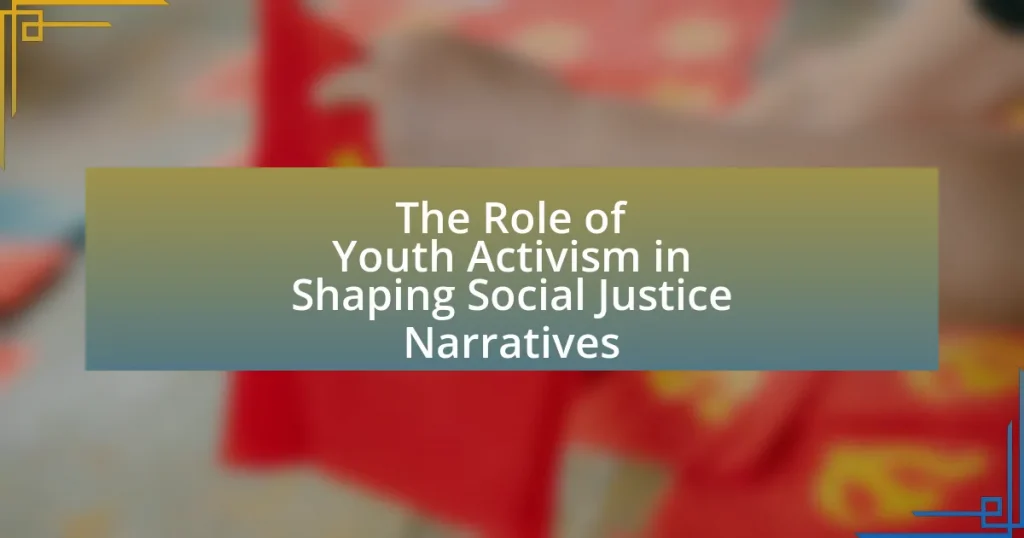The article analyzes the critical role of women in peace negotiations, emphasizing their contributions to fostering inclusivity and enhancing the legitimacy of peace processes. It highlights research indicating that agreements involving women are 35% more likely to endure for at least 15 years, underscoring the importance of their perspectives in addressing the needs of diverse populations. The article also discusses historical contexts, barriers to women’s participation, and strategies to enhance their involvement, including the implementation of gender quotas and training programs. Additionally, it provides examples of women’s influence in specific peace negotiations, illustrating the positive impact of their engagement on sustainable peace outcomes.
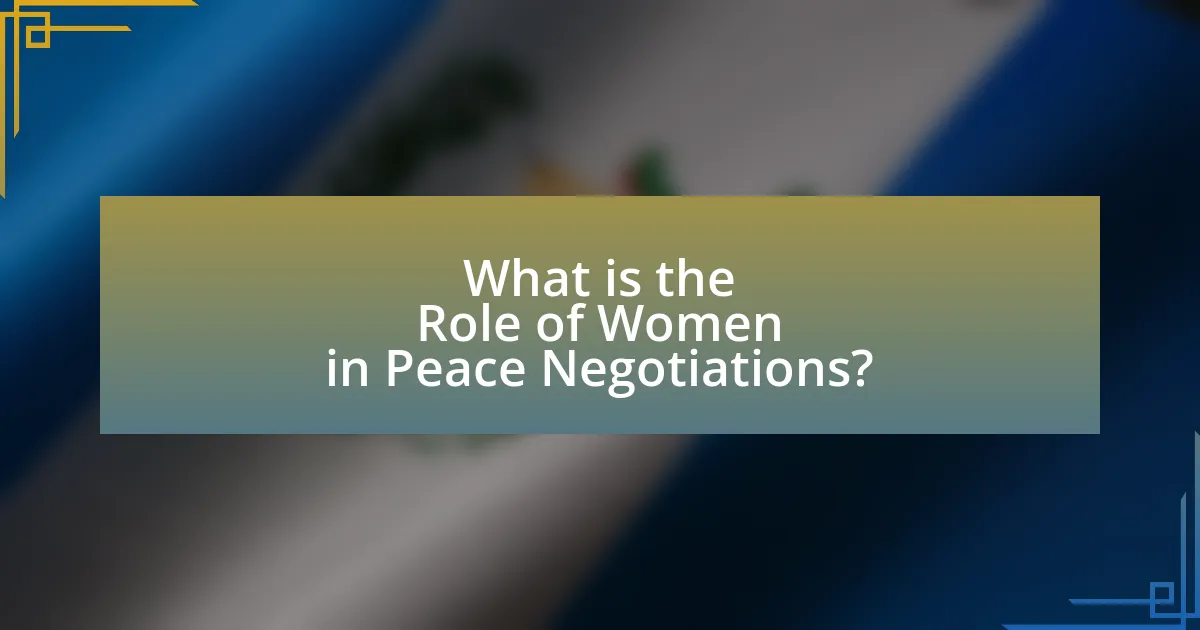
What is the Role of Women in Peace Negotiations?
Women play a crucial role in peace negotiations by bringing diverse perspectives, fostering inclusivity, and enhancing the legitimacy of peace processes. Research indicates that when women participate in peace negotiations, agreements are 35% more likely to last at least 15 years, as highlighted in the UN Women report “Women, Peace and Security: The Global Study on the Implementation of United Nations Security Council Resolution 1325.” Their involvement not only addresses the specific needs of women and marginalized groups but also contributes to more comprehensive and sustainable solutions to conflict.
Why is the inclusion of women important in peace negotiations?
The inclusion of women in peace negotiations is crucial because it leads to more comprehensive and sustainable peace agreements. Research indicates that peace processes that include women are 35% more likely to last at least 15 years. Women’s participation brings diverse perspectives and experiences, addressing the needs of a broader population and enhancing the legitimacy of the peace process. For instance, the United Nations Security Council Resolution 1325 emphasizes the importance of women’s involvement in peace and security efforts, highlighting that their participation can lead to more effective conflict resolution and post-conflict reconstruction.
What historical context supports women’s involvement in peace processes?
Women’s involvement in peace processes is supported by historical contexts such as the inclusion of women in post-World War II peace negotiations and the establishment of United Nations Security Council Resolution 1325 in 2000. After World War II, women’s contributions to rebuilding societies were recognized, leading to their participation in peace talks, exemplified by the 1946 Paris Peace Conference. Furthermore, Resolution 1325 emphasized the importance of women’s roles in conflict resolution and peacebuilding, acknowledging that their perspectives are crucial for sustainable peace. This resolution has since served as a framework for integrating women into peace processes globally, reinforcing their significance in negotiations and decision-making.
How do women’s perspectives contribute to more comprehensive peace agreements?
Women’s perspectives contribute to more comprehensive peace agreements by ensuring that the needs and experiences of diverse populations are represented. Research indicates that when women participate in peace negotiations, the resulting agreements are 35% more likely to last at least 15 years. This is evidenced by the UN Women report, “Women, Peace and Security: The Global Study on the Implementation of United Nations Security Council Resolution 1325,” which highlights that women’s involvement leads to more inclusive and sustainable solutions. Additionally, women’s perspectives often address social issues such as education, health, and economic stability, which are crucial for long-term peace.
What barriers do women face in peace negotiations?
Women face significant barriers in peace negotiations, including systemic discrimination, lack of representation, and cultural biases. Systemic discrimination often manifests in the exclusion of women from decision-making roles, as evidenced by the fact that women comprised only 13% of negotiators in major peace processes from 1992 to 2019, according to a report by the United Nations. Additionally, cultural biases can undermine women’s contributions, as traditional gender roles may prioritize male voices in conflict resolution. These barriers hinder women’s ability to influence peace agreements, limiting the effectiveness and inclusivity of the negotiation process.
What social and cultural obstacles hinder women’s participation?
Social and cultural obstacles that hinder women’s participation include deeply entrenched gender norms, lack of access to education, and societal expectations regarding women’s roles. Gender norms often dictate that women should prioritize family and domestic responsibilities over public or political engagement, limiting their involvement in peace negotiations. Additionally, in many regions, women face barriers to education and professional development, which restricts their ability to participate effectively in such processes. Societal expectations can further marginalize women’s voices, as they may be perceived as less credible or authoritative in negotiation settings. These factors collectively contribute to the underrepresentation of women in peace negotiations, as evidenced by reports from organizations like UN Women, which highlight that women make up only a small percentage of negotiators in peace processes globally.
How do institutional biases affect women’s roles in peace talks?
Institutional biases significantly limit women’s roles in peace talks by perpetuating gender stereotypes and marginalizing their contributions. These biases often manifest in the underrepresentation of women in negotiation teams and decision-making processes, as seen in various peace agreements where women’s participation is less than 10%. For instance, a study by the United Nations indicates that when women are included in peace negotiations, the resulting agreements are 35% more likely to last at least 15 years. This evidence highlights that institutional biases not only hinder women’s involvement but also negatively impact the effectiveness and sustainability of peace processes.
What strategies can enhance women’s participation in peace negotiations?
Increasing women’s participation in peace negotiations can be achieved through targeted strategies such as implementing gender quotas, providing training and capacity-building programs, and fostering inclusive dialogue processes. Gender quotas ensure a minimum representation of women in negotiation teams, which has been shown to lead to more comprehensive peace agreements; for instance, the United Nations has advocated for a 30% representation of women in peace processes. Training programs equip women with negotiation skills and confidence, enhancing their effectiveness in discussions. Additionally, creating inclusive dialogue processes that actively seek women’s perspectives can lead to more sustainable peace outcomes, as evidenced by research indicating that peace agreements are 35% more likely to last at least 15 years when women are involved in the negotiation process.
How can training and capacity-building initiatives empower women negotiators?
Training and capacity-building initiatives empower women negotiators by enhancing their skills, confidence, and strategic understanding of negotiation processes. These initiatives provide targeted education on negotiation techniques, conflict resolution, and communication strategies, which are essential for effective participation in peace negotiations. For instance, programs like the United Nations’ Women, Peace, and Security agenda emphasize the importance of women’s involvement in peace processes, demonstrating that when women are trained, they are more likely to influence outcomes positively. Research shows that women’s participation in peace negotiations leads to more sustainable agreements, as evidenced by a study published in the journal “International Negotiation,” which found that peace agreements are 35% more likely to last at least 15 years when women are involved in the negotiation process.
What role do international organizations play in promoting women’s involvement?
International organizations play a crucial role in promoting women’s involvement in peace negotiations by establishing frameworks and guidelines that advocate for gender equality and women’s participation. For instance, the United Nations Security Council Resolution 1325 emphasizes the importance of women’s roles in peace and security processes, mandating member states to ensure women’s participation in all levels of decision-making. Additionally, organizations like UN Women provide resources, training, and support to empower women leaders and activists, facilitating their engagement in peace talks. Evidence shows that when women are included in peace negotiations, the resulting agreements are more likely to be sustainable and effective, as highlighted in studies indicating that peace agreements with female participation are 35% more likely to last at least 15 years.
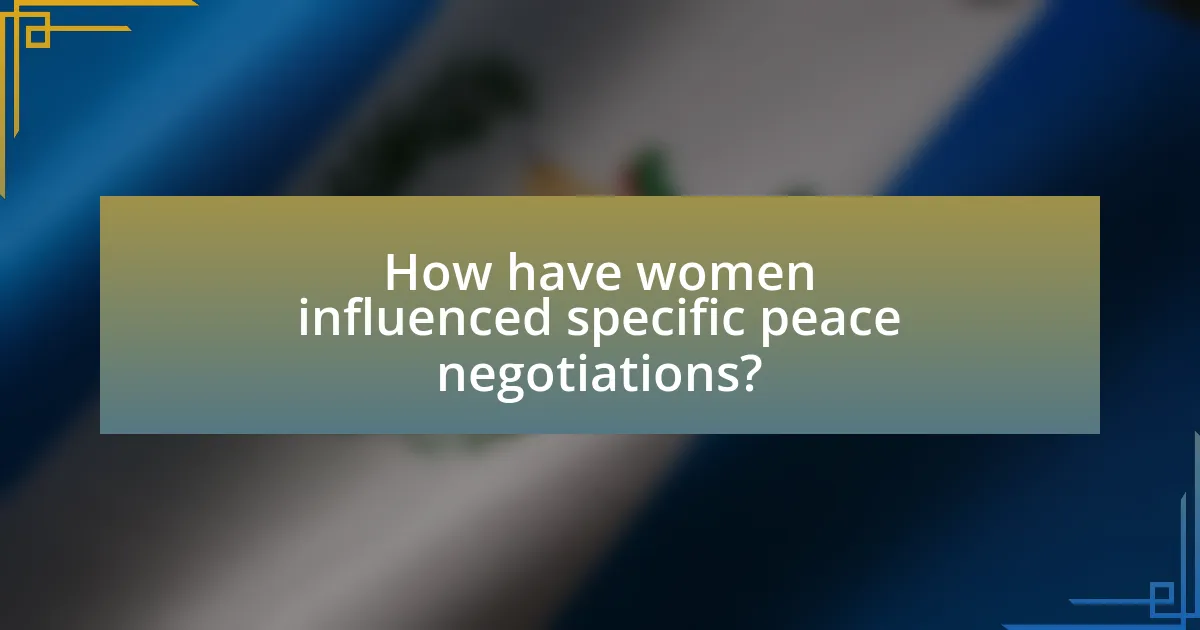
How have women influenced specific peace negotiations?
Women have significantly influenced specific peace negotiations by advocating for inclusive dialogue and addressing gender-specific issues. For instance, during the 1995 peace talks in Guatemala, women representatives played a crucial role in ensuring that the final peace agreement included provisions for women’s rights and gender equality, which were previously overlooked. Additionally, in the 2016 Colombian peace process, women’s organizations mobilized to demand their participation, resulting in the inclusion of a gender perspective in the agreement, which emphasized the importance of addressing sexual violence and promoting women’s roles in post-conflict reconstruction. These examples illustrate how women’s involvement in peace negotiations has led to more comprehensive and equitable outcomes.
What are some notable examples of women’s contributions to peace processes?
Notable examples of women’s contributions to peace processes include the involvement of Leymah Gbowee in Liberia, who played a crucial role in ending the Second Liberian Civil War through the Women of Liberia Mass Action for Peace movement, which mobilized women to advocate for peace. Additionally, women like Ellen Johnson Sirleaf, the first female president of Liberia, have influenced post-conflict governance and reconciliation efforts. In Colombia, women participated in the peace negotiations that led to the 2016 peace agreement with FARC, ensuring that gender perspectives were included in the final accord. These contributions demonstrate the significant impact women have had in shaping peace processes and promoting sustainable peace.
How did women impact the peace agreement in Liberia?
Women significantly impacted the peace agreement in Liberia by actively participating in peace negotiations and advocating for their inclusion in the political process. Their organized efforts, exemplified by the Women of Liberia Mass Action for Peace, led to a sustained campaign that pressured warring factions to consider women’s perspectives and needs in the peace talks. This grassroots movement culminated in the 2003 Accra Comprehensive Peace Agreement, which included provisions for women’s rights and representation in governance, reflecting the influence of women’s activism on the peace process.
What role did women play in the Colombian peace negotiations?
Women played a crucial role in the Colombian peace negotiations by advocating for gender inclusion and addressing issues specific to women affected by the conflict. Their participation was instrumental in ensuring that the final peace agreement included provisions for women’s rights and protections against gender-based violence. Notably, the Colombian government and the Revolutionary Armed Forces of Colombia (FARC) recognized the importance of women’s perspectives, leading to the establishment of a gender sub-commission during the talks. This sub-commission focused on integrating gender considerations into the peace process, reflecting the broader commitment to gender equality in post-conflict reconstruction.
What lessons can be learned from these examples?
The lessons learned from analyzing the role of women in peace negotiations include the importance of inclusive representation and the effectiveness of diverse perspectives in conflict resolution. Research indicates that peace agreements are 35% more likely to last at least 15 years when women are involved in the negotiation process, highlighting the critical impact of their participation. Furthermore, women’s involvement often leads to more comprehensive agreements that address broader social issues, as evidenced by the UN Women report, which emphasizes that women’s contributions can enhance the sustainability of peace efforts.
What best practices emerged from women’s involvement in these negotiations?
Best practices that emerged from women’s involvement in peace negotiations include the incorporation of diverse perspectives, fostering inclusive dialogue, and enhancing the legitimacy of agreements. Research indicates that women’s participation leads to more comprehensive peace agreements, as evidenced by a study from the United Nations which found that peace agreements are 35% more likely to last at least 15 years when women are involved in the negotiation process. Additionally, women’s engagement often results in the prioritization of social issues, such as health and education, which are crucial for sustainable peace.
How can these lessons be applied to future peace processes?
Lessons from the role of women in peace negotiations can be applied to future peace processes by ensuring inclusive participation and representation of women at all negotiation levels. Research indicates that peace agreements are 35% more likely to last at least 15 years when women are involved in the negotiation process, as highlighted in the UN Women report “Women, Peace and Security: The Global Study on the Implementation of United Nations Security Council Resolution 1325.” This demonstrates that integrating women’s perspectives leads to more comprehensive and sustainable peace solutions. Additionally, training programs that empower women as negotiators can enhance their effectiveness in conflict resolution, as evidenced by successful case studies in countries like Liberia and Colombia.
What is the future of women’s roles in peace negotiations?
The future of women’s roles in peace negotiations is expected to expand significantly, driven by increasing recognition of their contributions to sustainable peace. Research indicates that when women participate in peace processes, agreements are 35% more likely to last at least 15 years, highlighting their critical role in fostering long-term stability. Additionally, international frameworks such as the United Nations Security Council Resolution 1325 emphasize the importance of women’s involvement in peace and security, further legitimizing their participation. As global awareness grows and advocacy for gender equality strengthens, women’s roles in peace negotiations are likely to become more prominent and influential.
How can we ensure sustained engagement of women in peacebuilding efforts?
To ensure sustained engagement of women in peacebuilding efforts, it is essential to implement inclusive policies that actively promote women’s participation at all levels of decision-making. Research indicates that when women are involved in peace processes, the likelihood of reaching a lasting peace agreement increases by 35% (UN Women, 2015). Additionally, providing training and resources tailored to women’s needs can empower them to take on leadership roles, thereby enhancing their contributions to peacebuilding initiatives. Establishing networks and platforms for women to share experiences and strategies further solidifies their engagement and influence in these efforts.
What policies can be implemented to support women’s roles in negotiations?
Policies that can be implemented to support women’s roles in negotiations include mandatory gender quotas, training programs for negotiation skills, and the establishment of supportive networks. Mandatory gender quotas ensure that women are represented in negotiation teams, as evidenced by the United Nations’ call for at least 30% female participation in peace processes, which has been shown to lead to more sustainable agreements. Training programs enhance women’s negotiation skills, increasing their confidence and effectiveness; for instance, initiatives like the Women’s Peace and Humanitarian Fund provide resources for capacity building. Supportive networks, such as mentorship programs, facilitate connections between experienced negotiators and emerging female leaders, fostering an environment where women can thrive in negotiation settings.
How can grassroots movements influence women’s participation in peace processes?
Grassroots movements can significantly influence women’s participation in peace processes by mobilizing communities, raising awareness, and advocating for inclusive policies. These movements often empower women by providing them with a platform to voice their concerns and experiences, which can lead to greater representation in formal negotiations. For instance, the Women’s Peace and Humanitarian Fund has demonstrated that grassroots initiatives can effectively channel resources and support to women-led organizations, enhancing their capacity to engage in peacebuilding efforts. Additionally, research by the United Nations indicates that peace agreements are 35% more likely to last at least 15 years when women participate in the negotiation process, highlighting the critical role grassroots movements play in fostering women’s involvement in peace initiatives.
What practical steps can individuals take to support women’s involvement in peace negotiations?
Individuals can support women’s involvement in peace negotiations by advocating for gender-inclusive policies and practices within their communities and organizations. This can be achieved by promoting awareness of the importance of women’s perspectives in conflict resolution, as studies show that peace agreements are more likely to last when women are involved in the negotiation process. For instance, research by the United Nations indicates that women’s participation in peace processes can lead to a 35% increase in the likelihood of a peace agreement lasting at least 15 years. Additionally, individuals can engage in mentorship programs that empower women leaders and provide them with the necessary skills and networks to participate effectively in negotiations. By actively supporting initiatives that prioritize women’s voices, individuals contribute to a more equitable and sustainable approach to peacebuilding.
How can advocacy and awareness campaigns promote women’s roles in peacebuilding?
Advocacy and awareness campaigns can significantly promote women’s roles in peacebuilding by highlighting their contributions and addressing gender biases in conflict resolution. These campaigns raise public consciousness about the importance of women’s participation, which is supported by evidence showing that peace agreements are more likely to last when women are involved in the negotiation process. For instance, a study by the United Nations indicates that peace agreements are 35% more likely to last at least 15 years when women are included in the peace process. By showcasing successful case studies and mobilizing community support, advocacy efforts can empower women to take active roles in peace negotiations, thereby fostering inclusive dialogue and sustainable peace.
What resources are available for supporting women in peace negotiations?
Resources available for supporting women in peace negotiations include organizations, funding mechanisms, and training programs specifically designed to enhance women’s participation. Notable organizations such as UN Women and the Women’s International League for Peace and Freedom provide advocacy, research, and networking opportunities. Funding mechanisms like the Global Acceleration Instrument for Women, Peace and Security offer financial support to initiatives that empower women in peace processes. Additionally, training programs, such as those provided by the Institute for Inclusive Security, equip women with negotiation skills and strategies to effectively engage in peace talks. These resources collectively aim to increase women’s representation and influence in peace negotiations, contributing to more inclusive and sustainable outcomes.









